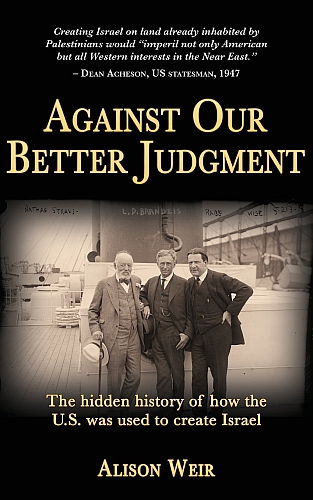

| AGAINST OUR BETTER JUDGMENT The Hidden History of How the U.S. Was Used To Create Israel Alison Weir CreateSpace Independent Publishing Platform, February 2014 |
Rating: 5.0 High |
|||
| ISBN-13 978-1-495-91092-0 | ||||
| ISBN 1-495-91092-X | 240pp. | SC | $10.00 | |
The roots of the interminable conflict between Israel and Palestine lie in the early years of the twentieth century. If this conflict is to be ended in any honorable way, understanding its roots is a necessary first step. Alison Weir has devoted a great deal of time in tracing those roots, and she presents here, with impressive scholarship, the results of her investigation.
A consistent thread runs through the twentieth century: the Zionist imperative to establish a Jewish homeland in the then 95% Palestinian territory in the Middle East. Just as consistently opposed to this imperative: numerous military and diplomatic officials of the United States government, who correctly perceived that supporting this imperative would undermine both the U.S. Constitution and the moral standing of America in the world.
While many people are led to believe that U.S. support for Israel is driven by the American establishment and U.S. national interests, the facts don't support this theory. The reality is that for decades U.S. foreign policy and defense experts opposed supporting the creation of Israel. They then similarly opposed the massive American funding and diplomatic support that sustained the forcibly established state and that provided a blank check for its aggressive expansion. They were simply outmaneuvered and eventually replaced. – Page 1 |
Alison Weir summarizes the progress of the Zionist imperative here. She is often asked why she took the trouble, since the matter did not affect her directly. The story began over 15 years ago, in autumn of the year 2000, when she was editor at a small California weekly newspaper. The Second Intifada had begun, and she began to follow the news about this uprising in Palestine. She soon realized that coverage of the event was markedly one-sided. She discovered a disturbing pattern: Palestinian children were being killed in greater numbers than Israeli children, and the Palestinians were often killed before any deaths took place in Israel.
It is truly remarkable that Israel, though certainly not the only bad actor in the Middle East, has been so little affected by the bad acts it has committed. These include a well-documented campaign of ethnic cleansing in Palestine, beginning well before World War II with relatively benign methods like buying parcels of land from Palestinians, but escalating to terrorism after that war. Less well known, but also documented in many accounts, were the covert actions of highly-placed Zionists in the U.S. who were often able to steer our government into policies that damaged America's best interests.
I'm certain disgust is not too strong a word to describe the Zionist campaign; it may not be strong enough. When the prime minister of Israel attempts to drive wedges between the branches of our federal government and thus derail a hard-won arrangement that promotes peace in the region.1 Israel can remain our valued ally if it starts treating the Palestinians like people with rights.
She consulted many books and articles on the subject of U.S.-Israel relations, interviewed their authors and other people who had been involved, and ultimately made several trips through Palestine herself. What she found refutes the popular image of Israel as a beleaguered nation surrounded by enemies bent on its eradication. The truth is that Israel was founded by Zionist aggression in Palestine, and that before, during, and after its founding a multi-national campaign of bribery, character assassination, deception, and outright coercion was carried out in order to forestall any opposition. We see the result today: An Israel whose leadership feels entitled to support from Western governments, especially the U.S., and will not hesitate to interfere with their policies when it deems those policies impediments to its expansionist plans.
The text of this book is short — only 91 small pages. However, there are 108 pages of endnotes, a 24-page list of works cited, and another list of additional sources for further reading. These lists contain 214 and 22 entries, respectively. There is also a decent index, which includes both the text and the endnotes. Being so short, it can serve only as an introduction to the complex and contentious history of Israel's creation. However, it is well written and extensively documented. I give it top marks and rate it a must-read on this vital issue as well as a keeper.2

 To contact Chris Winter, send email to this address.
To contact Chris Winter, send email to this address.